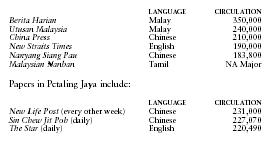Malaysia - Media
The government owns and operates a well-developed and well-equipped telecommunications system. In 2000, Malaysia had over 4.6 million mainline telephones, including private wire and public coin stations. The same year, there were an additional 5 million cellular phones in use throughout the country. Automatic dialing for the majority of exchanges is provided by a VHF radio circuit. Telegraph and radiotelephone connections link Peninsular Malaysia with most foreign countries.
Radio-Television Malaysia (RTM) operates radio and television stations in Kuala Lumpur, Sabah, and Kuching, and there is a commercial station, Sistem TV-3 Berhad, in Kuala Lumpur as well. Broadcasts are in English, Malay, five Chinese dialects, Tamil, and numerous local languages and dialects. As of 2001 Malaysia had 35 AM and 391 FM radio stations and 1 television station. In 2000, there were 420 radios and 168 televisions sets for every 1,000 people. In 2001, there were 4.1 million Internet subscribers served by seven service providers.
Malaysia generally has enjoyed a large measure of press freedom. In October 1987, however, the government closed four newspapers in an effort to end criticism of its policies. While the press is normally moderate and objective, it treads carefully when dealing with Malaysia's plural ethnic and cultural foundations. There are about 80 English, Malay, Chinese, and Tamil daily and weekly newspapers. The Malay-language press is the largest segment, followed by English, Chinese, Tamil, Punjabi, and Kadazan. The leading Kuala Lumpur dailies (with their 2002 circulations) are as follows:

| LANGUAGE | CIRCULATION | |
| Berita Harian | Malay | 350,000 |
| Utusan Malaysia | Malay 240,000 | |
| China Press | Chinese | 210,000 |
| New Straits Times | English | 190,000 |
| Nanyang Siang Pau | Chinese | 183,800 |
| Malaysian Nanban | Tamil | NA Major |
| Papers in Petaling Jaya include: | ||
| LANGUAGE | CIRCULATION | |
| New Life Post (every other week) | Chinese | 231,000 |
| Sin Chew Jit Poh (daily) | Chinese | 227,070 |
| The Star (daily) | English | 220,490 |
Though the constitution provides for freedom of speech and a free press, in practice the government is said to restrict the flow of information deemed "sensitive" including issues regarding citizenship of non-Malays and the special position of Malays in society. The media generally practices self censorship, providing laudatory, noncritical coverage of government activities.